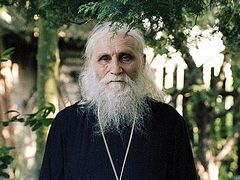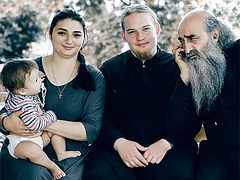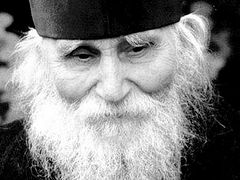Sorrows are unavoidable in human life, especially in the lives of followers of Christ. How can we not give way to discouragement and despair when we have to face injustice and evil? How can we liven up? Where can we find examples of a genuinely Christian attitude towards various sorrows? How can we “rejoice always” (1 Thess. 5:16) and trust in Christ? Igumen Dovmont (Belyayev), rector of the Church of the Dormition of the Mother of God at Ivangorod Fortress1 answers these questions. For Fr. Dovmont, Elder Nikolai Guryanov and his nanny Irina were models of this full, wholehearted trust in God.
—Fr. Dovmont, should Christians be optimistic? After all, Christ says: Fear not (Lk. 12:32), anoint thine head [when fasting] (Mt. 6:17), and so on.
—In my view, “optimistic” is not a very appropriate word. Let me clarify the concepts. It is not about optimism; rather, it is about penetrating into and having a deep, true knowledge of the essence of things. Christ came to the world with a specific purpose: Firstly, to give the Gospel teaching to mankind—Repent ye, and believe the gospel (Mk. 1:15); the Lord started preaching precisely with these words. And, secondly, to make the atoning sacrifice through His Passion and death on the Cross and enable the faithful to share in this sacrifice through the sacrament of Eucharist. The culmination of His mission was His Resurrection and Ascension to Heaven. Beyond all doubt, Christ knew what awaited Him. It couldn’t have been otherwise, since Christ is True God and True Man. As God He is all-knowing. And what He expects and has always expected from His followers is full trust, and not “Komsomol2 optimism”. Trust means faith: Let not your heart be troubled: ye believe in God, believe also in Me (Jn. 14:1). And faith works effectively provided it is founded on sincere love for Christ.
—What does it mean to love Christ?
—The Gospel answers this question by the words of Christ: He that hath My commandments, and keepeth them, he it is that loveth Me: and he that loveth Me shall be loved of My Father, and I will love him, and will manifest Myself to him (Jn. 14:21).
You see, the main source of suffering is the loss of faith, and not a lack of “optimism”. In the patristic tradition this state is called despondency. It depends on the inner state of the soul and not on outside factors. When faith in Christ grows weak, everything loses its meaning. I cannot help but recall the words of Fyodor Dostoevsky: “If faith and Christ have no authority with us, we will be lost in every way.”3
No substitutes or additions to Christianity will work, according to Dostoevsky, who learned a lot by experience:
“If you distort the faith of Christ, combining it with the aims of this world, then the entire meaning of Christianity will at once be lost, the mind will definitely fall into unbelief and all that will be built is merely a new Tower of Babel instead of the great ideal of Christ.4”
As we know, the building project of the Tower of Babel failed.
—The reason for joy in Christianity may seem odd: In the world ye shall have tribulation (Jn. 16:33). St. John Chrysostom was humiliated and persecuted, the twentieth-century New Martyrs were sadistically tortured and killed… But the Christians have been rejoicing over the centuries, saying, “Glory to God for all things!”
—Christ didn’t promise a life of joy, optimism (now it is called comfort), and abundance to His followers. He even cautioned against worldly prosperity as against a serious danger:
Blessed are ye, when men shall hate you, and when they shall separate you from their company, and shall reproach you, and cast out your name as evil, for the Son of Man's sake. Rejoice ye in that day, and leap for joy: for, behold, your reward is great in heaven: for in the like manner did their fathers unto the prophets. But woe unto you that are rich! for ye have received your consolation. Woe unto you that are full! for ye shall hunger. Woe unto you that laugh now! for ye shall mourn and weep. Woe unto you, when all men shall speak well of you! for so did their fathers to the false prophets. But I say unto you which hear, Love your enemies, do good to them which hate you, Bless them that curse you, and pray for them which despitefully use you (Lk. 6:22-28).
—But dishonor and humiliation don’t necessarily lead to heavenly bliss. After all, not everyone in prison is an innocent sufferer.
—I absolutely agree. Let us recall Apostle Peter’s strict words:
But let none of you suffer as a murderer, or as a thief, or as an evildoer, or as a busybody in other men's matters (1 Pet. 4:15).
We are only blessed when we are unjustly persecuted and mocked for our faith in Christ. As for lack of justice on earth… Note that not only does Christ discourage us from suing our offenders in court; He also calls on us to rejoice and pray for them.
 Archpriest Nikolai Guryanov. A photo from local residents’ personal archives —Why?
Archpriest Nikolai Guryanov. A photo from local residents’ personal archives —Why?
—Because this spiteful world of hatred doesn’t accept us. We are alien to it. And, you know, this makes us glad. The holy apostles said of the world, And we know that we are of God, and the whole world lieth in wickedness (1 Jn. 5:19). Such things as maliciousness or playing nasty tricks on others should be unthinkable for Orthodox Christians.
If a man say, I love God, and hateth his brother, he is a liar: for he that loveth not his brother whom he hath seen, how can he love God Whom he hath not seen? And this commandment have we from Him, That he who loveth God love his brother also (1 Jn. 4:20-21).
—Have you ever met any people who always give thanks to God in suffering?
—Yes, I did. In 1994, I was appointed rector of the Church of Archangel Michael in the village of Kobylye Gorodishche of the Gdov district of the Pskov Diocese. This village happens to be the birthplace of a famous elder: mitered Archpriest Nikolai Guryanov. But I am not going to speak about him now. When I arrived at the parish, his nanny was still alive—handmaid of God Irina. Everybody called her “Granny Irisha [a diminutive and affectionate form of the name Irina.—Trans.]”. She lived in the village of Chudskaya Rudnitsa over seven miles away from the church. She was well over ninety. By saying “nanny” I don’t mean that she was like Arina Rodionovna, who was the beloved nanny and tutor of the poet Alexander Pushkin—the descendant of a noble family. Such nannies as Irina were girls who were charged by peasant families with the duty of looking after their very little children, feeding them, and taking care of the household. Such nannies were not much older than those in their care. As a rule, these were girls aged seven to nine. But they could already cook kasha (porridge) and shchi (cabbage soup) and do the housework. As for the older girls, peasants would take them to work in the field. Fr. Nikolai’s parents were simple peasants. Thus little Nikolai’s parents would entrust him to Irisha’s care during the haymaking or harvest season.
I met granny Irisha when I was invited to Rudnitsa to give Communion to its aged villagers during Great Lent. By that time she had been bedridden for several years. Irina lived in the house of her youngest daughter (an elderly woman), who took care of her mother. Irina’s children were of a very different spirit—ordinary Soviet collective farmers. I saw that they had only invited me out of respect for their mother.
While speaking with her, I was stunned by full lucidity of the eldress’s mind at such an advanced age. But what amazed me the most was the light of spiritual joy that this bedridden woman radiated. During our conversation I didn’t hear Irina complain about her illness, or her life, or any people even once. Throughout the conversation she repeated the same phrase several times: “Father! How happy I am. I have enjoyed good health all my life. Thank God!”
—And did she tell you anything about Elder Nikolai?
—Yes, she recalled his childhood years. She sent him her best regards while laughing. She said: “When you go to Zalit [or Talabsk—an island in Pskov (Chudskoye) Lake in the Pskov region.—Trans.] to Fr. Nikolai, give him my regards—from Irisha.” Then she recalled: “Whenever Kol’ka [an affectionate and diminutive form of the name Nikolai.—Trans.] acted up, I, a sinner, would smack him on the lips. And now, you know, he is a priest. It was such a great sin of mine!” She also recalled that as a boy, Nikolai used to play “priest”. He would fit up a bathhouse as a church, gather other children around him, and they would hold “cross processions” with prayers around the “church”.
Fr. Nikolai’s parents were Alexei and Ekaterina. Despite his peasant origin, Alexei sang in the church choir. It can be said that he was a professional singer. At the Church of Archangel Michael I found a chest full of sheet music copied out by hand. These were classical sacred hymns of the Synodal period [between 1700 and 1917.—Trans.]: work by Bortnyansky, Arkhangelsky, Chesnokov and other prominent composers of church music. According to Fr. Nikolai’s memories, Alexei would sing tenor. Their choir director had a musical education and was sent from St.Petersburg. Until the Russian Revolution the Gdov region had been part of the Petersburg governorate. Thus Fr. Nikolai inherited his musical talent from his father. The elder could read music perfectly well, played the harmonium, and even composed music for spiritual songs. I learned many interesting facts about the life of Elder Nikolai’s family from his nanny. Soon I travelled to Zalit to visit Fr. Nikolai. I conveyed cordial greetings to him from Irisha. The elder smiled and said, “I pray for her.”
Communication with these marvelous people left the warmest memories in my heart forever. Reflecting on these people’s lives, I was astounded by the light and peace they radiated. But their lives were anything but easy. They had gone through backbreaking peasant toil, “collectivization”, repressions, labor camps, the war, and the German occupation. The elder showed me the house in the village of Chudskiye Zakhody, where their family had once lived and from where they had been evicted by the commissars back in the 1930s. The question arises: Would these people have withstood all these trials and tribulations without faith in Christ the Savior? I don’t think so. It was not without reason that Elder Nikolai used to repeat the Russian proverb, “Without God you can’t walk through a doorway, but with God you even can traverse the seas.”
—It is hard for many to put up with the fact that they will have to endure hardships and become confessors of their faith. And some are even destined to receive a martyr’s crown.
—In truth a martyr’s crown is heavy. It is participation in the glory of the Crucified and Resurrected Christ. And you have to deserve this honor. It is a great privilege for every Christian to suffer for Christ. It is no coincidence that the Savior said that we are blessed if we suffer for His sake.
—Can you give pastoral advice as to how we Christians should respond to injustice and persecution?
—Of course, in accordance with the Holy Scriptures. Let us read them not only with our eyes but also with our everyday lives. It is possible, as practice shows. More than that, it is vital, if we want to be called Christians by right. Let us keep in mind the words of Apostle Paul:
If it be possible, as much as lieth in you, live peaceably with all men. Dearly beloved, avenge not yourselves, but rather give place unto wrath: for it is written, Vengeance is Mine; I will repay, saith the Lord. Therefore if thine enemy hunger, feed him; if he thirst, give him drink: for in so doing thou shalt heap coals of fire on his head. Be not overcome of evil, but overcome evil with good (Rom. 12:18-21).
From the bottom of my heart I wish all of us to overcome evil in this way. I will repeat: a victory is possible; we should not despair, for Christ is on our side.




